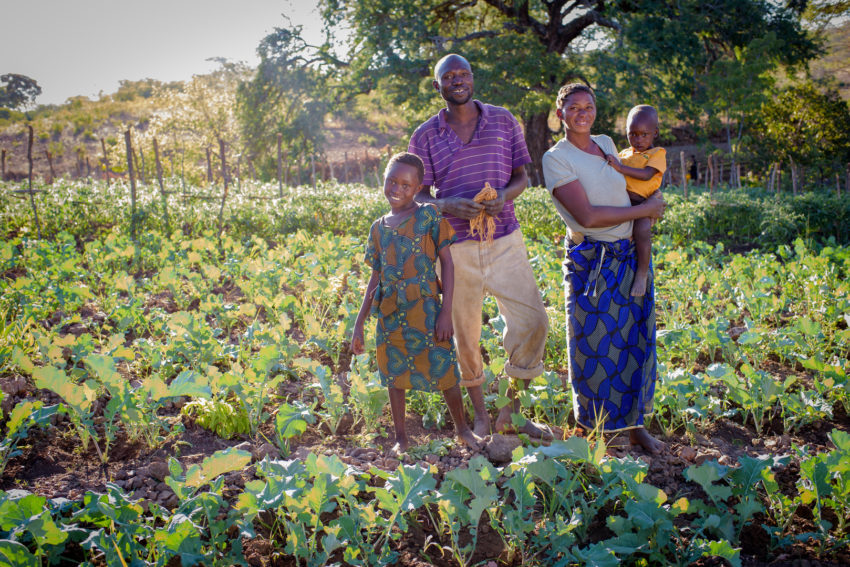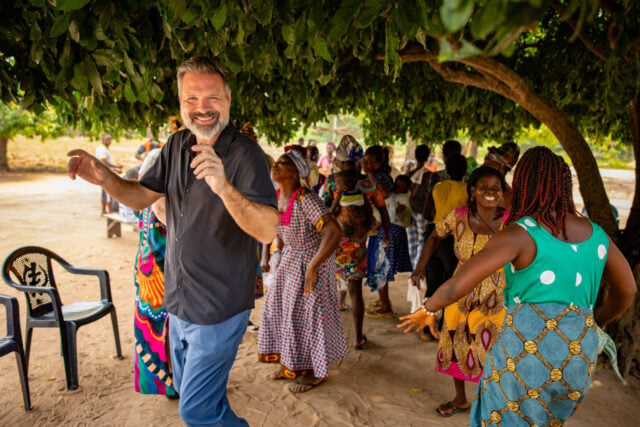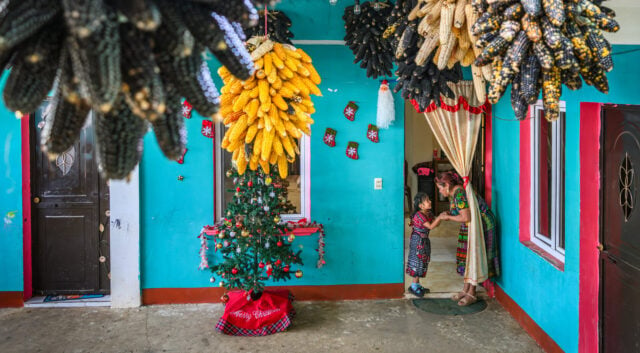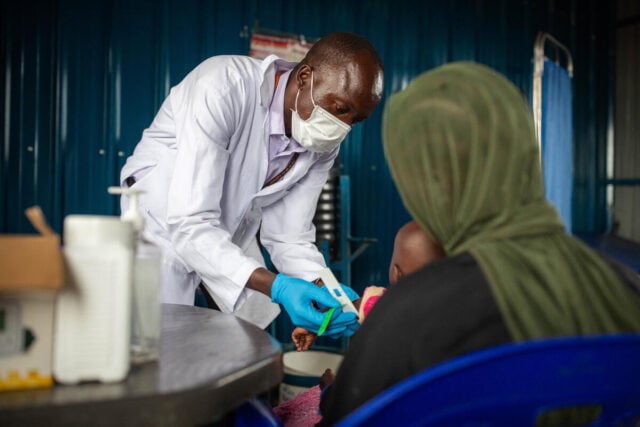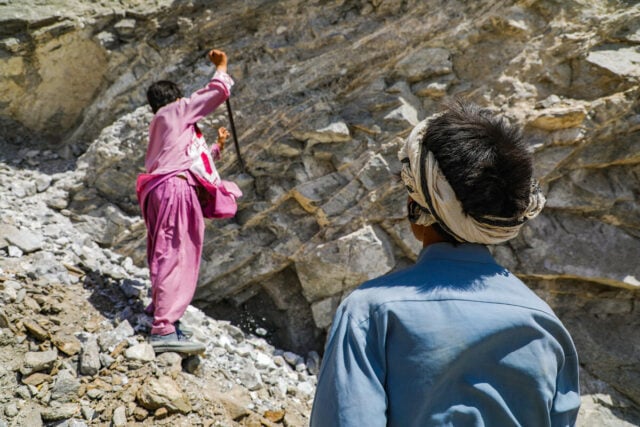More than three-quarters of Zambia’s 18 million people are small-scale farmers. To feed themselves and produce an income, they depend on annual rainfed crops like maize. In a dry year like 2019, they struggle. In Moyo village, and other drought-prone areas of Zambia, World Vision helps families expand their sources of food and income through improved agriculture, savings, and the rearing of livestock, especially goats.
Learn how four families with children in World Vision’s sponsorship program are coping with this year’s drought.
Gardening
Milton Mudenda, 40, and his wife, Seida Hamalambo, 37, are struggling to provide for their family this year because of drought. They lost money on maize, their usual cash crop. Even though they carried buckets of water to keep their crop alive, it wilted and died before it got chest high.
“We just pray to God that he will give us the means to eat,” says Milton. The couple’s other main concern is paying school fees for their three oldest children. Milton belongs to a savings group, one of many World Vision has organized in Moyo, Zambia. He took out a loan to the pay school fees for their eldest daughter, Fidus, when she was sent home from school.
“We have a few chickens, but no goats or cows. If we receive goats from World Vision, that will be a great help to us,” Milton says. They are on the list to receive goats from World Vision’s Animal Give-back Program and hope to receive the animals soon.
“When we get goats, I will herd them, and I will keep them out of the garden. I like goats and I know how to do this,” says Joyce, a 9-year-old sponsored child.
Farming God’s way
This year, because of drought, their garden is more important to Milton’s family than ever before. “The best income we have now is gardening,” says Milton.
Milton is a model farmer who trains others in high-yield agriculture that causes minimal disturbance to the soil. He received training from World Vision in 2011 and has farmed this way ever since. World Vision staff trained Milton in a conservation farming method called Farming God’s Way, which is funded by sponsorship under World Vision Zambia’s Sustainable Enterprises and Economic Development program.
“One difference with this method is you don’t have to clean the field; you just clear where you plant,” Milton says. There are rocks and grasses between his wide rows of tomatoes and greens. These serve as a mulch and help hold moisture in the soil.
Farming God’s Way is cooperating with God’s natural processes and caring for the earth. “It’s important to use this kind of farming because you don’t plow and it builds up the soil,” Milton says. “When you plow, the soil washes away down the hill.”
Milton’s family cares for a large garden with tomato plants that they have recently transplanted and others that are flowering and will soon have fruit. Beans are growing between the tomato plants, and there are rows and rows of greens.
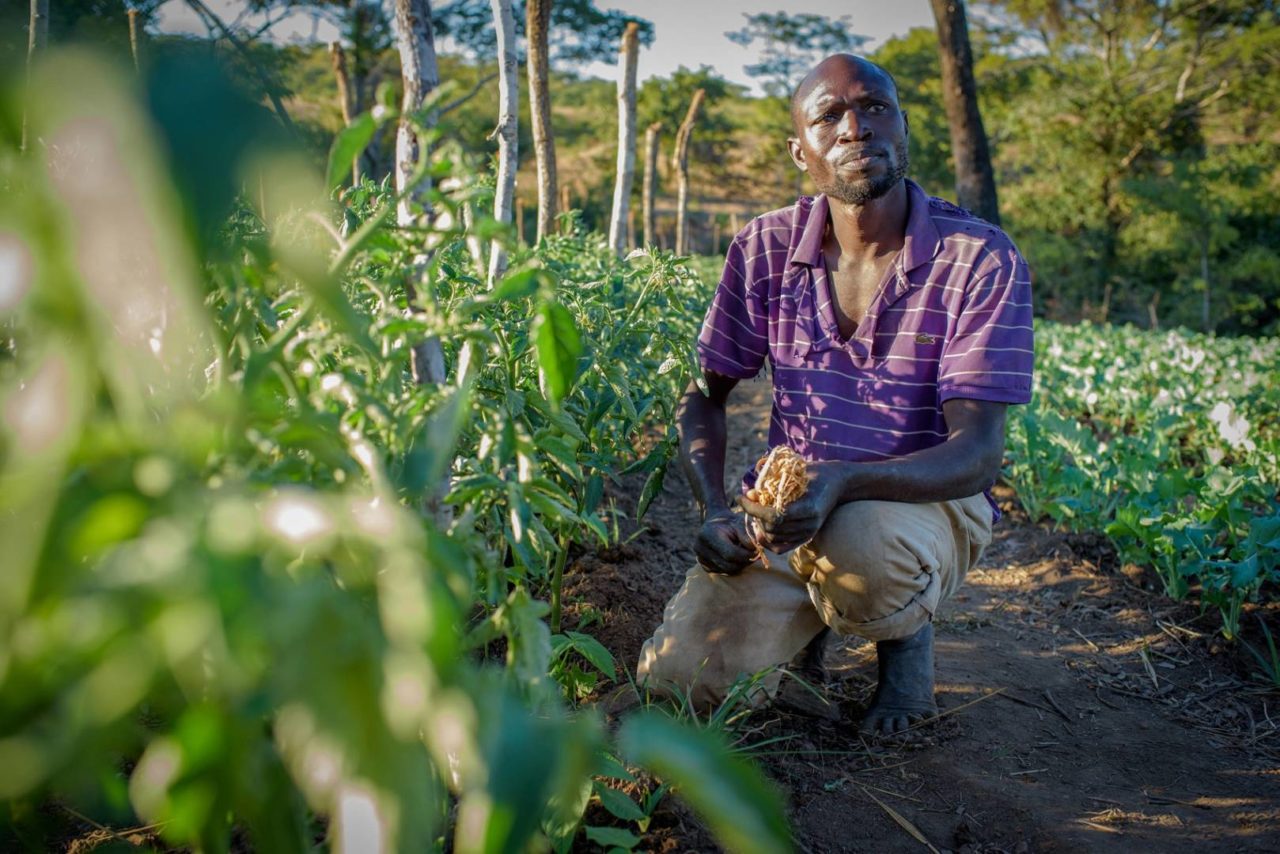
“There was not enough water where our garden was before, so we started gardening here just two months ago,” Milton says. He hopes to make two good crops before the nearby stream runs dry. “We may have to dig in the dry streambed to water [the plants],” he says.
After school, Joyce drops off her books at home and then comes to the garden to help with watering. “I like to stay here at the garden. I water and I help to keep animals out of the plants,” she says. She likes the collard greens best, but when there are ripe tomatoes, she picks and eats them right in the garden. “It’s nice to have this good food. Others don’t have such good things to eat,” she says.
Seida also spends her days in the garden. “My husband and I work hard at this because we want our children to go to school. We want them to reach their full potential and be independent,” she says. “If they get an education, they can choose what they want to do.”
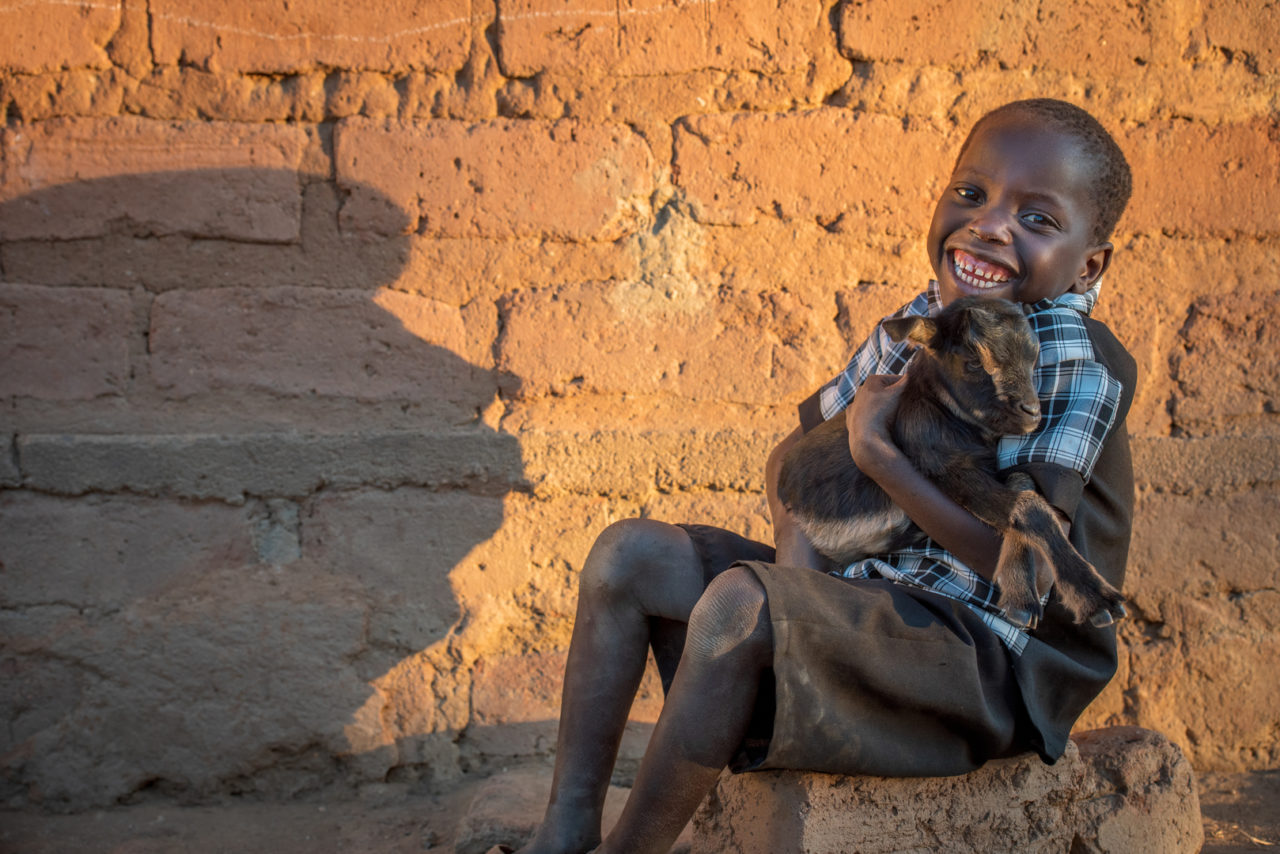
Goat rearing
Since they started raising goats for milk and to sell, Atfellow Mainza, 47, and his wife, Sheba Sibayumba, 42, say their family’s life has changed for the better. While drought is causing a lot of hunger in their Zambia community, Sheba says: “We look to goats to save us from that.”
Atfellow already had experience with goats when their family received four females and one male from World Vision a year back, but he was in for some surprises. “The male goat was a bigger breed than the local stock, so we’re getting better kids now,” he says. The four female goats have each produced a large kid.
When he got the World Vision goats, Atfellow built a raised shed to house his stock. “Lots of kids died before we built the raised housing, but not anymore,” he says. As his goat herd grows, the animals’ pedigree, health, and survival rates are improving too.
Atfellow’s community chose him to attend livestock management training from World Vision and the provincial agriculture department because of his skill with goats and commitment to his own stock. Now he’s a community livestock assistant. When his neighbors have problems with diseases in goats or a mother goat has difficulty delivering her kid, Atfellow goes to treat them.
Atfellow and Sheba’s son Sydeny, 6, helps to herd the family’s goats for milking. “I drink milk every day, and I can milk a goat, too. It’s not hard,” he says as his smiling father looks on.
Sending children to school
To get through the drought, many of Atfellow and Sheba’s neighbors are considering pulling their children out of school and cutting back on meals. “When I see those without goats, they’ve got a big problem. It’s difficult to see how some of them will survive,” Atfellow says.
While Atfellow and Sheba won’t achieve all they’d hoped for this year because of the drought, their children’s schooling is assured.
At the same time, other parents in their community are struggling to decide which, if any, of their children they can afford to send to school. They answer impossible questions as best they can. When money is tight, is it better to keep a younger child out of school until they are 7 or 8 so that the older ones can continue to learn? Or should older children go to work in the fields to generate income?
Sheba and Atfellow have five children in school, including Sydeny, the youngest, a preschooler at Simweemba community school. “We want them to go to school so they’ll be independent,” Sheba says.
When it’s time to go to school, Sydeny runs happily down the hill from his home nearby. He’s keen to learn and calls out the A, B, C’s and 1, 2, 3’s with the other children. When his teacher calls out, “Follow, follow, follow! Follow the leader,” Sydeny jumps to join the line.
If it weren’t for his family’s goats, his mother says, Sydeny might be sitting out this year of preschool.
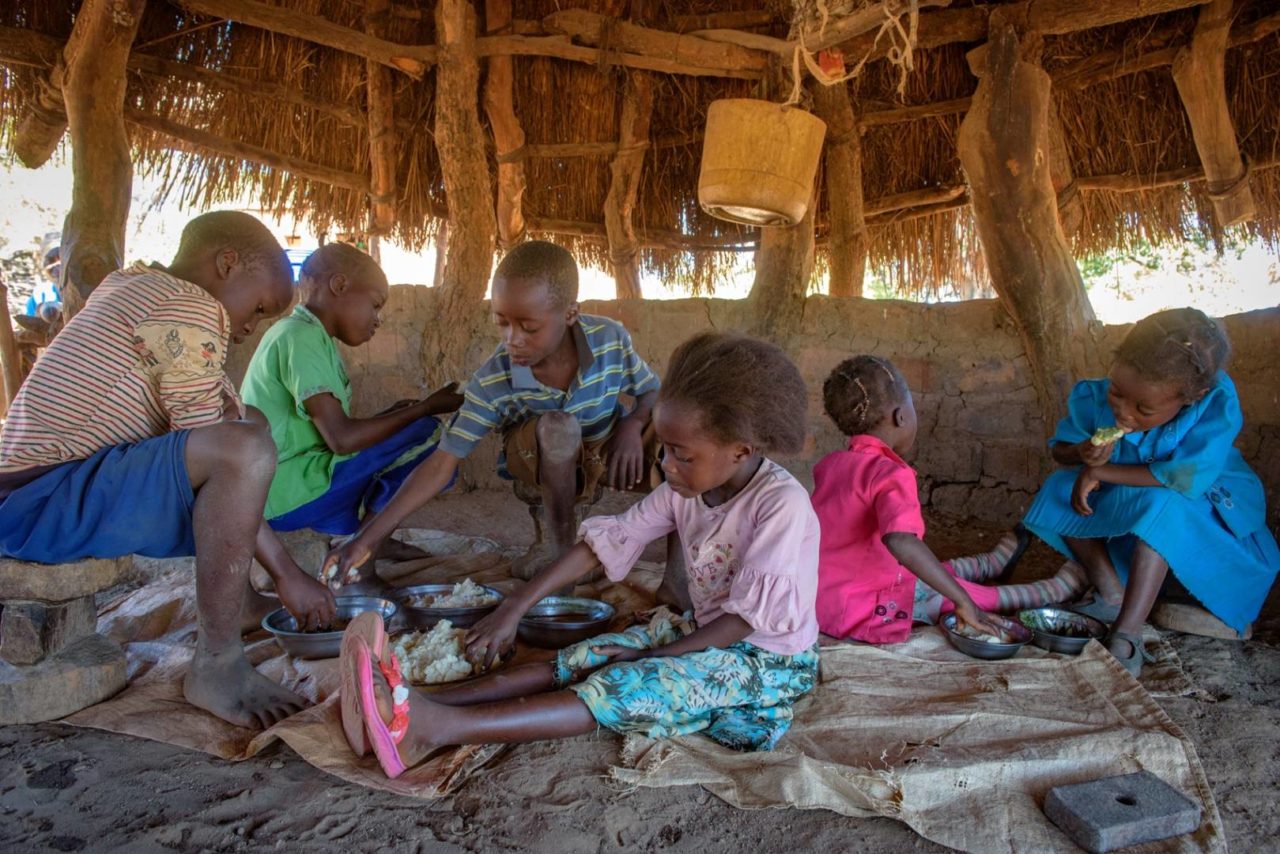
Savings and loans
Patricia Simulangu, 27, and her neighbor stir up a healthy meal for their children returning from school. In three pots over two open cooking fires, they cook nshima, a cornmeal porridge that’s the staple food for Zambian families; fresh-picked collard greens from the garden; and mundyoli, a high-protein dish of pounded peanuts and dried pumpkin leaves.
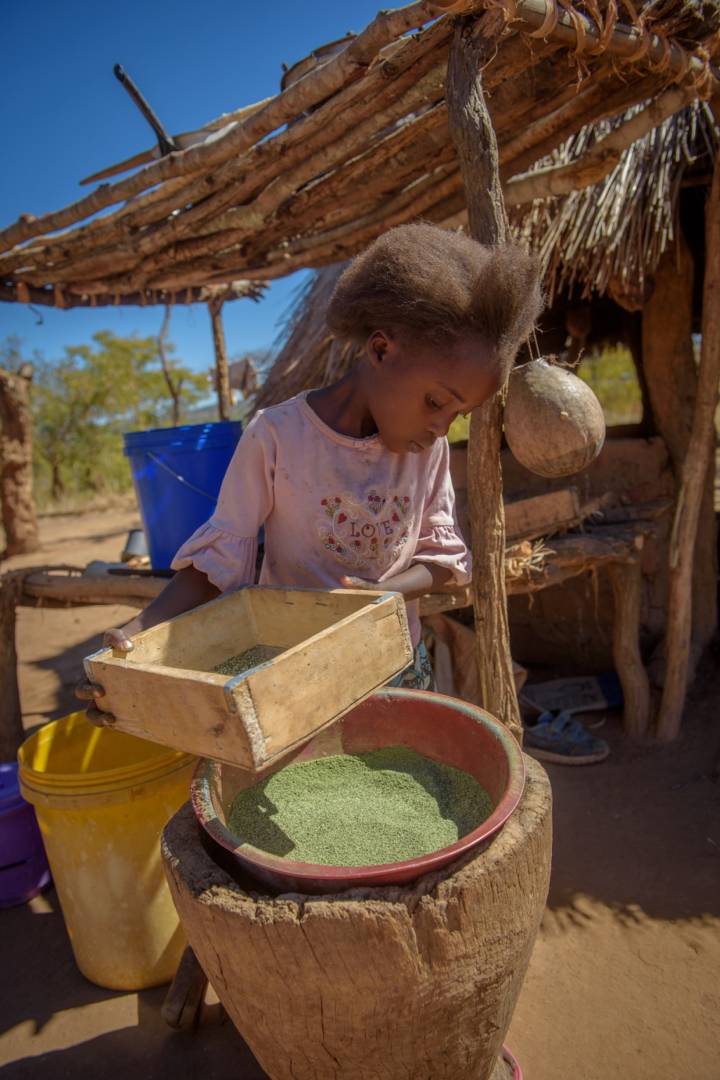
Then, in the shade of the thatched-roof kitchen, Patricia’s children, Better, 9, and his sisters Loveness, 7, and Hannah, 4, eat a hearty lunch with neighbors Mercy, 8, Francis, 11, and Grace, 5.
Because of drought, Patricia and her husband, Eliot Choobwe, 41, didn’t harvest enough maize to feed their children nshima all year, as they usually do. The maize was gone in a month and their peanuts will soon be gone, too. If they’d had normal rain, there would be enough corn and peanuts to last a full year until the next harvest, Patricia says.
“So far, we haven’t had to cut back on food,” says Eliot. “But I haven’t paid school fees.” Without maize to sell, he hasn’t been able to raise the money.
Patricia and Eliot had two goats and received five more from World Vision last year. They value the goats for manure that nourishes their garden and for milk that the children drink. “We could sell a goat,” says Patricia, but they don’t want to do that until their herd is larger.
After lunch and household chores, Patricia and the children walk 20 minutes to reach their garden on a riverbank. They carry goat manure in buckets to fertilize and mulch the plants, then fill the buckets in the river to water their growing tomatoes, onions, and greens. Instead of the broad, fast-flowing stream they’re used to, the stream is drying up.
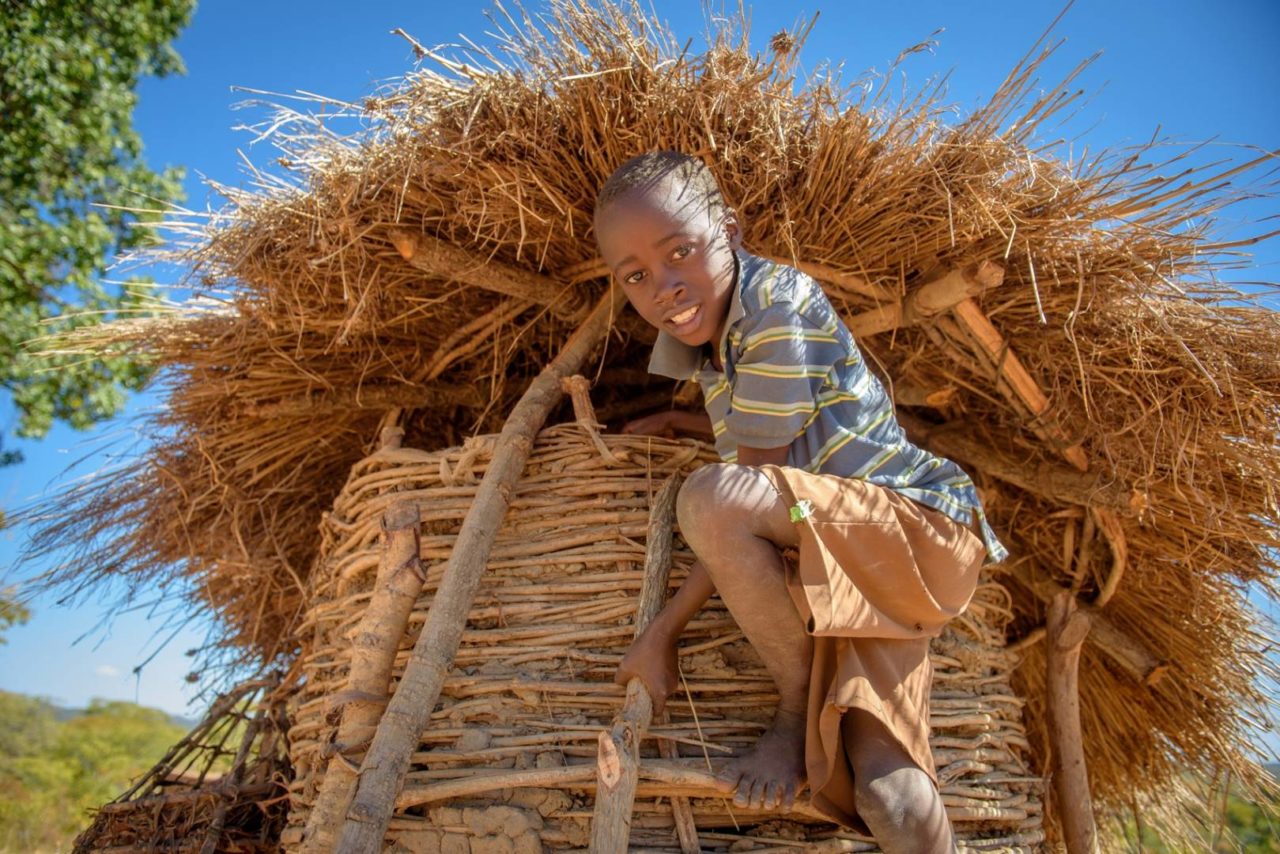
“I’m always thinking about how to get money for next week’s food,” says Patricia. When she had lots of chickens, she sold some to buy food and household items. She watches prices in the market closely to know when it will be profitable to take a loan from her savings group and buy bananas or other items she can sell for a profit. “Then I pay off the loan and make enough money to buy food,” Patricia says.
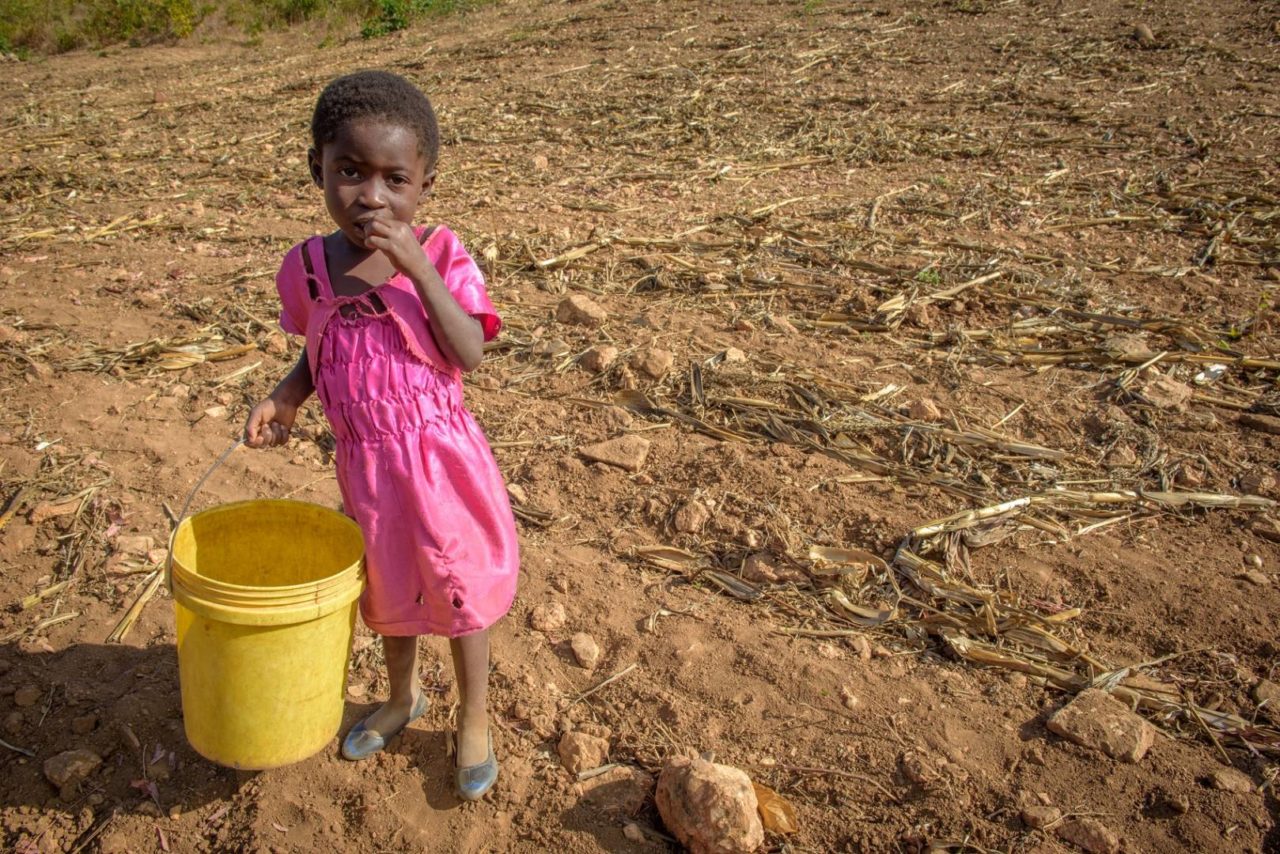
Cutting back on portions
Ruth Makala, 4, and her little brother, Vernon, 2, sit in the shade of their mud hut’s thatch roof as their mom, Kezia Moono, 20, places a small lump of nshima, cornmeal porridge, on a tin plate on the ground between them. Kezia and her husband, Oudence Sichwno, 30, watch without eating as the children share their noon meal. Because of drought, they struggle to have enough food. They’ve cut back on portions for lunch so there will be enough to eat again in the evening.
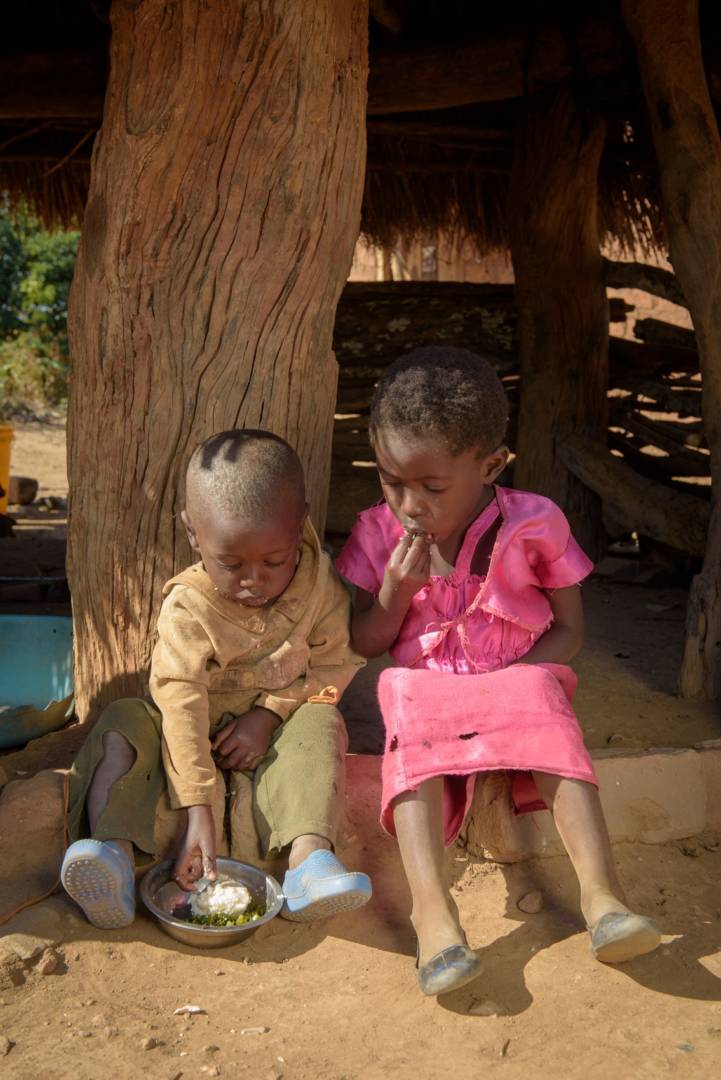
“We’re running short of grain,” Oudence explains. “I expect we’ll have days when we won’t have anything.” Says Kezia, “I don’t feel good as a parent. I feel like I’m failing for my children not to eat all they want.”
They grew maize, but couldn’t harvest it, Oudence says. Instead of flowering and making ears of corn, it dried up. They mostly eat vegetables — greens, tomatoes, and onions — from their garden. “When there’s enough rain, we can garden for a long time, but not now,” says Oudence. Daily, they carry buckets of water from a rapidly drying pool to pour on the plants. In this drought season, it’s hard to keep the garden alive.
Oudence gardens to supplement his income as a teacher.
“Teaching is my calling,” he says. During class, he is in constant motion and full voice — hopping, singing, crouching, and tracing the shapes of letters with a stick in the sand as children crowd around him, rapt. He seems single-mindedly focused on instructing and inspiring the 69 students from preschool to grade 2 who attend Simweemba Primary. A high school graduate, Oudence couldn’t afford to attend college to become a certified teacher. He taught for two years in another community before coming to Simweemba school. “This is my home, and I want to contribute here,” he says.
The school was founded, funded, and built by the community. Parents started the school so their younger children could attend classes without having to walk several kilometers every day. They brought bricks and beams and built two one-room structures. The preschool classroom has a corrugated metal roof while the older children study under the open sky.
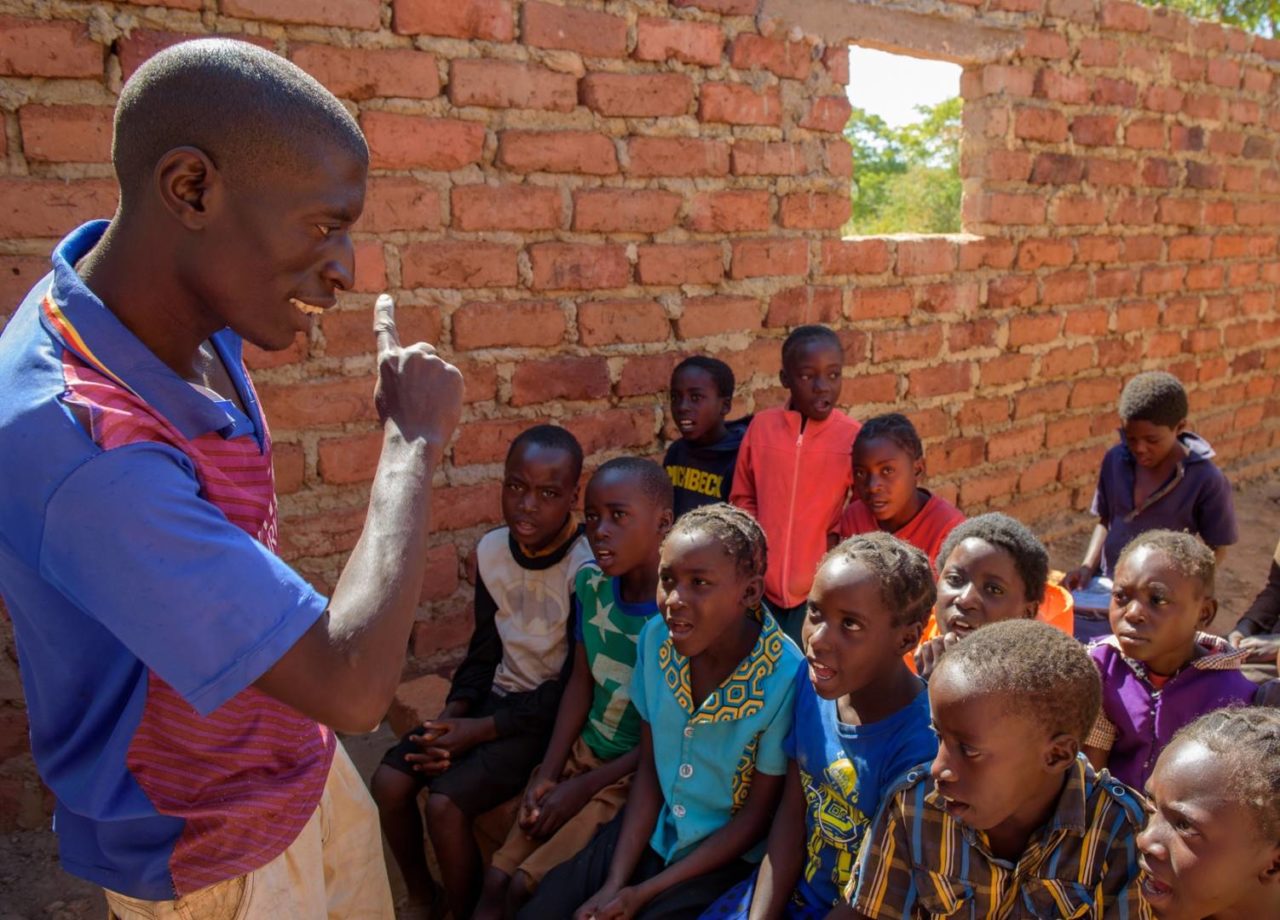
Since the drought, construction on the school has halted. Many parents are struggling to feed their families and can’t afford 30 kwacha for each student (US$1.97) that pays Oudence’s salary and the school’s expenses for a three-month term. Two weeks into the term, only eight students of 69 have paid anything.
“When I talk to parents [about school fees], some say they would prefer to withdraw their children because they can’t pay. It’s hard for them, but it’s hard for me, too,” he says.
“Maybe I’ll have to spend my time on other things besides teaching to be able to feed my family.”
As their food stocks and garden produce dwindle, Oudence and Kezia weigh whether they should sell some of the animals they’ve worked so hard to get. When times were better, they bought two goats and 20 pigeons. Two of their four hens are sitting on clutches of eggs that will hatch within days. They’re holding off in hopes of receiving five goats from World Vision’s Animal Give-Back Program. “Five more goats will make all the difference for us,” Oudence says. When the goats come, he’ll be ready, having attended World Vision livestock management training and built a better goat house. The main thing is to take care of the goats so that they will multiply.
“Then we can decide to sell some, and maybe I can go to college,” he says.
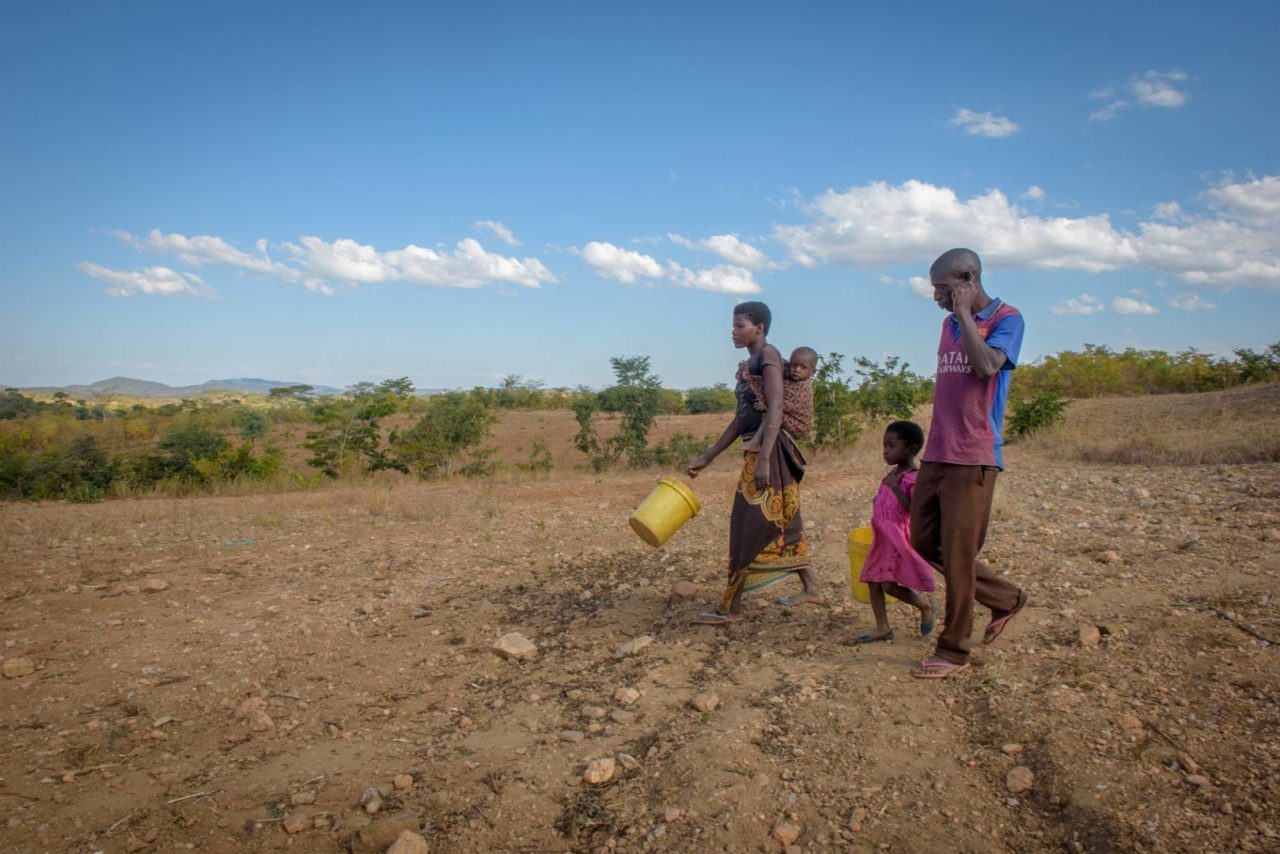
Read about another family in Moyo whose goats bring blessings or find out more about Africa’s hunger crisis.
